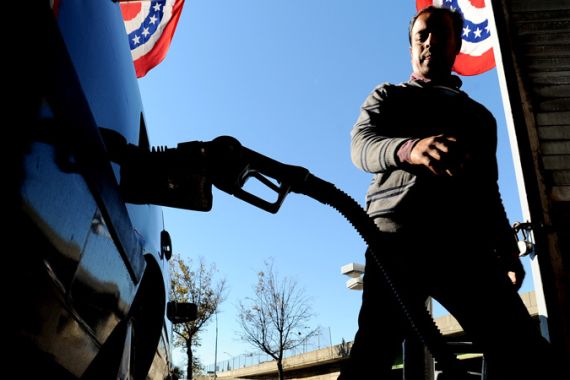Oil giants battle US state over contamination
ExxonMobil and Citgo face New Hampshire in court over cost of cleaning up widespread groundwater contamination.

Two oil giants, ExxonMobil and Citgo, are battling in court against the US state of New Hampshire over who is responsible for the cost of cleaning up widespread groundwater contamination from the petrol additive methyl tertiary butyl ether, better known as MTBE.
The trial, expected to be the most complex and time-consuming in the state’s history, has just got under way. The state wants $700m to monitor and treat contaminated sites.
“MTBE is a toxic chemical that does not belong in the state’s drinking water,” said Jessica Grant, attorney for the state, which estimates more than 40,000 wells have MTBE.
Keep reading
list of 4 itemsAfter the Hurricane
World’s coral reefs face global bleaching crisis
Why is Germany maintaining economic ties with China?
Sixty per cent of state residents rely on private wells for their drinking water.
During opening arguments Grant showed jurors what she described as memos from high-level ExxonMobil employees counselling the company against MTBE’s use due to environmental concerns.
They also warned about the high cost of remediation if it was used.
“A significant part of the state’s case will be presented from the defendants’ own documents,” Grant said.
MTBE is one of a group of chemicals known as oxygenates. The US government requires oxygenates be added to petrol so that it burns more cleanly and reduces air pollution.
The problem is when it leaks from petrol stations, storage tanks or junkyards. Grant told jurors that it would only take 10 gallons [38 litres] of petrol to contaminate a nearby lake of 62 million gallons, making it unpalatable.
Once it is in the water it is very difficult to treat.
Cheaper option
State attorneys allege the companies chose to use MTBE, despite knowing the risks, because it was cheaper than other options. The additive has been banned in the state since 2007.
“This case is about the state second-guessing decisions made by Congress, the EPA [Environmental Protection Agency], and by the state’s own officials to rely on gasoline [petrol] with MTBE as the solution to air pollution,” Exxon’s attorney, Claire Hassett, said in an email.
“This case is not about health risks or personal injuries. There is no MTBE crisis in New Hampshire. There is not a single recorded case of anyone getting sick from drinking water with MTBE in it – not in New Hampshire, not anywhere else.”
But the state says studies show MTBE is linked to cancer – a concern for one resident of Dover, New Hampshire who spoke to Al Jazeera on condition of anonymity.
After a leak at a nearby petrol station, MTBE contaminated her well. She can’t talk publicly about her case due to an agreement with the state, which installed a filtration system in her front yard, in a shed nearly 2 metres tall.
She says she can’t sell her home as a result – and she spent a lot of time and money dealing with the problem.
“It almost broke me and I’ve never recovered,” she said.
The state said it has identified over 200 sites that will require clean-up.
“Clearly, New Hampshire families cannot trust big oil companies when it comes to our drinking water. They said MTBE would help clean up cars and reduce the air pollution,” Catherine M Corkery, director of the New Hampshire Sierra Club, said.
“The time has come when the oil companies must clean up their messes and pay us for the damages they caused.”
“Should the public pay for cleaning up the spills? Should the public pay for drilling new wells?” said Jim Rubens a former Republican state senator and political consultant who has studied the issue. “The core concept is: polluter pays.”
The oil companies argued that the state should be going after whoever is responsible for the leaks.
This is the first time a state has gone to trial against oil companies for MTBE, though there have been many other lawsuits brought by municipalities, water districts or individual well owners.
Most have ended in settlements. New York City was awarded $105m in a 2009 federal jury trial for contamination of city wells but Exxon Mobile is appealing that verdict.
The New Hampshire trial includes more than 50,000 exhibits and is expected to take four months.